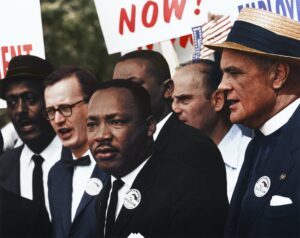It was a bright Sunday afternoon in March of 1981. Sitting in a circle of the ordained, I awaited words of wisdom for the journey I was about to undertake. In a few minutes we would proceed into the sanctuary, where the congregation of this small Baptist church would ordain me to “the Gospel ministry.” The men on my ordination council—and they were all men—were largely bivocational ministers. They labored in working-class jobs to sustain themselves and their families, and worked as ministers because they were called. Each shared, in turn, brief words of insight for the sacred vocation to which I aspired. One of the eldest among them repeated an injunction I have since heard many times over: “Just remember, son, that your duty is always to comfort the afflicted, and to afflict the comfortable.” I have never forgotten, even though it is difficult sometimes to sort out one from the other.
These words returned to me as I read a recent conversation between Stanley Hauerwas and William H. Willimon, published in The Christian Century under the headline: “The dangers of providing pastoral care.” This tête-à-tête strongly advocates for “afflicting the comfortable.” In places it appears to be onto something important. At others, the reasoning seems confused and contradictory. I find the core critique to be puzzling and obscure, perhaps even misplaced and ill-timed. But I’m getting ahead of myself.
Before getting into details, I should put my cards on the table. Like Hauerwas and Willimon, I am a white male who has spent decades teaching at a divinity school situated within an elite university. I am likely a prototype for the pastoral care they might find “dangerous.” After completing seminary, where I majored in pastoral care and completed a unit of Clinical Pastoral Education, I entered a Ph.D. program in pastoral theology. During that program I worked as a hospice and hospital chaplain, and undertook clinical training in psychotherapy. Since completing the Ph.D. and clinical training, I taught pastoral theology and counseling at Vanderbilt Divinity School for 23 years, and worked intimately with distressed individuals, couples, and families as a pastoral counselor for over 30 years.
That said, I do not recognize myself or my life’s work in the description of pastoral care these men offer. Willimon worries that clergy will succumb to the image of “the pastor as the empathetic helping healer who goes for the low-hanging fruit by encouraging people to display and then lick their wounds.” Both participants in this discussion portray empathy with suffering individuals as “hand-holding,” as the coddling of whiners, as indulging the narcissistic absorption of people preoccupied with their own pain.
At best, this is a caricature of the pastoral care I have conducted, that I have taught, and, I dare say, of the pastoral care most commonly provided by pastors of congregations—not to mention the care given to communities by congregations themselves. Genuine empathy does not reach for low-hanging fruit. It is not easy or placating. It is not simply a recognition of emotions but reaches beyond feelings to the deeper values and hopes that have been defeated, unfulfilled, or neglected. After over 30,000 sessions of counseling, I am confident that the vast majority of people who have sought my help do not wish to be coddled. Instead, they most often feel ashamed that they need assistance at all.
“I am confident that the vast majority of people who have sought my help do not wish to be coddled. Instead, they most often feel ashamed that they need assistance at all.”
Now, for the details. If I could sit with Hauerwas and Willimon over food and drinks, I imagine we would discover much over which we agree. The mentors who shaped my understanding of pastoral theology and care, especially Liston Mills and Peggy Way, insisted that every theology presumed an implicit psychology—some notion of “self”—and every psychology concealed an implicit theology. Often, they noted, the theologies embodied in Western psychologies were quite inimical, for example, to historical Jewish and Christian conceptions of salvation—particularly what was held up as ideals for being human. The individualism that pervades most popular psychology, which prioritizes individual happiness and places personal fulfillment over against communal belonging, is foreign to virtually all the religions of antiquity. In light of the current epidemic of loneliness, it seems that it doesn’t even produce contentment for individuals.
Hauerwas and Willimon, like my mentors, clearly reject an individualism that ends up isolating people. They value the congregation, and see pastoral care as a function of congregations themselves, rather than simply a task of pastors. And they reject any effort to split pastoral care off from the prophetic ministry of churches. On such important and critical matters, I believe we would agree.
This means that these churchmen do not actually reject pastoral care, or see all pastoral care as “dangerous,” as the title of the published conversation might suggest. What they appear to be railing against is a form of pastoral care they perceive as dominating white mainline churches, especially those that are relatively wealthy. Hauerwas sees such pastoral care as preoccupied with “the bourgeois concerns that have come to preoccupy the White mainline church in recent years.” Willimon tells seminary students that “ministry defined as ‘meeting people’s needs’ is dangerous in a society where the more affluent and privileged among us have solved with a credit card most of our biblical needs like food, housing, and clothing.” He admonishes clergy: “Running errands for the anxiously affluent is hardly worth a life.”
I get it. It seems obvious that individualistic self-absorption now runs deep in the veins of the United States, as Christopher Lasch forewarned in his 1979 book Culture of Narcissism. And I appreciate that these men are calling attention to racial and class analysis. But this is where matters start getting slippery. First, even among the privileged congregations these theologians have in mind, the situation is not as simple and straightforward as they claim. Second, if we take into account the degree of economic inequality in our time, and the advancing erosion of the middle class, it seems evident they are criticizing an already-diminishing version of “pastoral care.” An exclusive preoccupation with the faults of pastoral care for the privileged runs the risk of casting aspersions on any sort of pastoral care for everyone else. In their haste to criticize a certain representation of pastoral care, they wield a hatchet where a scalpel is needed.
Let’s begin with the “bourgeois” congregations they have in mind. I do not deny that such churches are often sprinkled with distressed individuals capable of demanding an inordinate amount of a pastor’s time and energy. (In truth, this occurs in congregations regardless of class or racial composition.) But, aside from making broad generalizations about the nature of their worries, to claim that the pastoral care of these persons is typical is to mistake the exception for the rule. The individualism shaped by today’s neoliberal culture emphasizes perfectionism, extreme self-sufficiency, and competition. In this atmosphere we become unduly preoccupied with our own “brand,” carefully and assiduously marketing and curating ourselves. Appearing “wounded,” or even vaguely sad, is anathema in such an environment.
“An exclusive preoccupation with the faults of pastoral care for the privileged runs the risk of casting aspersions on any sort of pastoral care for everyone else.”
Consequently, the vast majority of people are loathe to present themselves for care, pastoral or otherwise. They are apt to view their suffering as a sign of personal weakness, and thus are full of shame. This may be one reason why psychotherapists and other mental health professionals now far outnumber the clergy. Individuals who feel pressured to be perfect tend to seek the privacy of an office legally obligated to confidentiality, located apart from their social lives, for fear that their personal misery will be made public. People today, in societies of advanced capitalism, generally do not seek help for psychological, interpersonal, or spiritual distress until their pain becomes unbearable.
This is why I simply cannot believe Hauerwas’s and Willimon’s narrative that pastors are burning out primarily because the members of their bourgeois churches are reveling in victimhood and insisting on “displaying and then licking their wounds.” In fact, my experience as a pastoral psychotherapist suggests that people in the upper classes are likely to feel the pressure of neoliberal perfectionism, self-promotion, and competition more intensely than their working-class cohorts. The last thing they are inclined to do is to reveal their “failures” to their pastors. Instead, I am convinced that pastors today are not so much burdened by providing pastoral care—which they largely understand and appreciate—as they are by the same neoliberal expectations that plague their members.
This is exacerbated by an ecclesial landscape in which churches themselves are compelled to conform to the dictates of capitalism. Thus churches, like business corporations, are expected to expand their properties and memberships, grow their budgets, cultivate an atmosphere of happiness and success, and increase value to their “shareholders” (i.e., members). The pastor is effectively perceived as a CEO, and is subjected to constant benchmarking and evaluations rooted in neoliberal assumptions and values. Caught between these expectations and the fact that most Christian churches are continuing to shed property, cash, and members, pastors today find themselves in a soul-killing vice grip. It is not providing pastoral care that is dangerous for pastors. It is the insistence that they must become capitalist entrepreneurs.
Before moving to my second point, I must again forego the hatchet and wield a scalpel, this time to clear up some murkiness in the conversation between Hauerwas and Willimon concerning individualism and narcissism. Individualism is not to be confused with individuality. Individualism places the needs of individuals over against the community, and prioritizes the absolute independence and freedom of individuals. This is what neoliberal capitalism does. Individuality, on the other hand, recognizes the uniqueness and infinite value of each and every individual, but does not pit the individual and community against each other. The preciousness of the individual is reflected, as I see it, in many of the sayings of Jesus recorded in the Gospels. The individual is so valuable that “even the very hairs of your head are all numbered” (Matt. 10:30; Lk. 12:7). In the Gospels, and the New Testament generally, the well-being of individuals and the community are not inevitably in conflict. Indeed, the beloved community envisioned here is the ultimate grounding for individuality. This is very close to the pan-African notion of ubuntu, often translated as “I am because we are.”
By contrast, the discussion between Hauerwas and Willimon assumes any attention to the distress of individuals to be de facto individualism, and thus detracts from or competes with the health of the congregation, not to mention the Christian message and mission. This is apparently why they consider pastoral care to be “dangerous.”
I cannot accept this dichotomy. Whenever individuals, within the safety of caring relationships, have the courage to disclose their distresses and failures (both real and perceived), this opens up a space in which genuine communion can emerge. As such disclosure unfolds, participants discover not just their individuality, but their common griefs, sufferings, and transgressions. This serves to build up the community, not tear it down. Such is the wisdom of the confessional in the history of Christian worship. My suffering and my failures become our suffering and our failures. Without the realization of our common “woundedness,” the bonds of community become superficial and fragmented. This helps explain why, during years of psychotherapy sessions, many individuals who were in recovery, having become accustomed to the intimacy and authentic sharing within their recovery groups, admitted to me that they no longer found regular church attendance meaningful. Without the bond of shared grief and suffering, church now seemed superficial or even disingenuous. Perhaps our common grief is a critical element in what it means to be church.
“It is not providing pastoral care that is dangerous for pastors. It is the insistence that they must become capitalist entrepreneurs.”
Similarly, narcissism cannot be reduced simply to moral failure, as Hauerwas and Willimon seem to suggest. The actual experience of narcissism is much more nuanced and textured. Even the most grandiose forms of narcissism, manifest as an inflated sense of self, belie an undercurrent of emptiness, fear of failure and even worthlessness. One of my mentors, a psychoanalyst, once told our supervisory group about a former patient who, he said, was typical of persons having narcissistic disorders. After the patient had developed trust in him over a long period of time, he confessed during a session: “I absolutely insist on being admired, but I am the least admirable person I know.” This fear of “not being enough” is emblematic of the narcissism that accompanies the perfectionism of the neoliberal self, even in its less grandiose versions. Narcissism is how suffering looks and feels when it is isolated from the distress of others, when we feel alone, invisible, and unacceptable. And it is most often accompanied by depression, anxiety, and/or addiction.
While this narcissism pervades neoliberal cultures, it is perhaps most evident in the upper classes, and thus in the bourgeois churches that lie in the crosshairs of the critique delivered by Hauerwas and Willimon. An interesting and counterintuitive characteristic of contemporary narcissism is that the sufferers are often not aware of their suffering, much less of the true origins of their misery. It is a suffering that is unconscious of itself as suffering. This is a form of torment that I have elsewhere described as “third order suffering.” The prescription for this malady is not to have people stop obsessing about their pain, as Hauerwas and Willimon would have us believe, but to have them become more aware of their anguish. This creates the possibility that they will develop more empathy with the suffering of others, and thus escape the bonds of their solitary confinements. Rather than impeding community, this aids the development of the sort of communion Hauerwas and Willimon value so highly.
Now, for my second point. I am puzzled as to why these scholars and churchmen focus their grievances with pastoral care on the personal attention they believe is typical of pastors in bourgeois congregations. They appear to imagine that these are the sort of churches that are the norm. This presumes the conventional view that most of the people in the United States belong to a broad and generally prosperous middle class, with a few people comprising the poor and the rich at each end of a bell curve. This is not the United States we now live in. As sociologists Earl Wysong, Robert Perrucci, and David Wright have documented, there is no longer a secure middle class in the United States. These researchers argue that the new class structure in this country is a “double diamond” configuration, with a small diamond consisting of the “privileged class” sitting on top of a much larger diamond that comprises the “new working class.” The former represents 20% of the population, while the latter is 80% of working age adults. In effect, Hauerwas and Willimon critique the pastoral care of the churches in the privileged class. But what about the pastoral care of the 80% who now live in almost continual precarity, even if not in poverty? Beyond a passing reference to the importance of care for the dying, there is practically nothing in this discussion about pastoral care needs that the classes have in common, much less care that is especially attuned to the working class.
Moreover, even though Hauerwas and Willimon point to class and race, there appears to be very little here that demonstrates a thorough grasp of class and racial dynamics, much less their intersections. For example, when Willimon claims that “the more affluent and privileged among us have solved with a credit card most of our biblical needs like food, housing, and clothing,” he does not seem to know that it is not the privileged who most rely on credit cards, but the working class. The wealthy leverage debt to create more wealth. It is the working class, which also happens to be disproportionally people of color, that uses debt in order to survive. He also does working class folks no favors when he drives a wedge between material and non-material needs, and dismisses the latter as selfish. He continues: “So we move on to assuaging personal needs the Bible doesn’t give a rip about—meaning making, a purpose-driven life, balance, freedom from anxiety, or a sense of personal well-being.”
“Though Hauerwas and Willimon point to class and race, there appears to be very little here that demonstrates a thorough grasp of class and racial dynamics, much less their intersections.”
I will leave aside any commentary about the asymmetry of this list, as well as my bafflement as to what Bible he is reading. Instead, I must emphasize that the inequality of such “personal needs” between the privileged class and the working class is as pronounced as the material needs Willimon regards as more biblical and thus, I suppose, legitimate. Yes, working class and poor people (and the working poor) would like better access to adequate food, housing, and clothing. But they would also like to have some of the non-material benefits that the privileged class largely takes for granted, like, say, some basic human respect. As a matter of fact, a modest amount of “freedom from anxiety” and “sense of personal well-being” would go a long way for most working class and racialized people these days. Besides, the Bible happens to regard non-material needs—such as faith, hope and, especially, love—as bound up in and intimately entangled with the material means for survival. “Man shall not live on bread alone, but on every word that comes from the mouth of God” (Matt. 4:4).
Here, Hauerwas and Willimon remind me of arguments by a number of critical theorists—almost inevitably white males—insisting that any appeal for meeting one’s personal needs, or for self-care, is a narcissistic collusion with neoliberalism. The definitive rebuttal of this assertion was given by Audre Lorde, a queer woman of color: “Caring for myself is not self-indulgence, it is self-preservation, and that is an act of political warfare.” Elaborating on Lorde’s statement, Sara Ahmed observes: “Neoliberalism sweeps up too much when all forms of self-care become symptoms of neo-liberalism. When feminist, queer and anti-racist work that involves sharing our feelings, our hurt and grief, recognizing that power gets right to the bone, is called neo-liberalism, we have to hear what is not being heard.” She then concludes: “Those who do not have to struggle for their own survival can very easily and rather quickly dismiss those who have to struggle for survival as ‘indulging themselves’.”
I am concerned that Hauerwas and Willimon may be committing a similar misunderstanding, if not transgression, when they portray pastors’ simple empathetic care for others as going after “the low-hanging fruit by encouraging people to display and then lick their wounds.” It is hardly enlightening when they placidly state that “Woundedness is the predictable price we pay for being sent on outrageous assignments by Jesus,” or that “Vocation is more to be desired than victimhood.” We should be cautious about valorizing woundedness as the cost of discipleship. Most of the woundedness in the world is not because people have followed Jesus. And people are not being victims when they are actively struggling to get the boot off their necks, or simply to survive.
In effect, this dialogue between two white men sets a low bar for the pastoral care that is so badly needed today. Hauerwas concludes: “If in a hundred years Christians are identified as people who do not kill their children or the elderly, we will have done well in our pastoral care.” Really? I can only assume that such a statement is intended to shock rather than be taken seriously. And when he adds: “Words like care, love, and compassion can be self-deceptive when not disciplined and driven by our theological commitments,” I have to wonder if behind the theological commitments to which he alludes lurks the image of a muscular Jesus who kicks asses and takes names. As historian Kristin Du Mez has documented, we have had enough of that Jesus already.
Finally, I question the location and timeliness of this anti-empathy diatribe, appearing as it does in the middle of a global pandemic, in the context of political chaos, in the shadow of a rejuvenated white supremacy and emboldened patriarchy, record-breaking economic inequality, and a withering level of empathy in our society—especially toward those we perceive as different or foreign. What we need is more pastoral care, not less; more empathy, not less. To an overwhelming degree, pain in our world has little or nothing to do with narcissistic self-indulgence, or wallowing in victimhood. The outliers who appear masochistically attached to their pain are not typically catered to or coddled, as Hauerwas and Willimon insinuate. Rather, they are easy targets for discipline, punishment, blame, and shame. Pain is not primarily a plea for attention. It is a cry for connection in the midst of alienation, for justice where there is none, for love where apathy and hate prevail.
This is why, in the Gospels, healing is a core feature of Jesus’ ministry. It is quite appropriate to recognize, as Hauerwas and Willimon obviously do, that pain is not simply to be vanquished. Some suffering—death, disease, grief, etc.—is endemic to the human condition. However, pain must always be heard. What is it saying to us, and about our world, in the particular situation where it arises?
In a neoliberal world that offers us “networking” instead of friendship and mutuality, and substitutes “measurable outcomes” for the virtues of faith, hope, and love, we have never needed a recovery and reformation of genuine care and the healing arts as much as we do today. Attending to the many ways our souls are wounded by a soul-killing global capitalist order—and the conditions under which our woundedness might bind us to one another and to our planetary home—is the beginning, not the end, of nurturing the sort of faith communities that Hauerwas and Willimon appear to envision.
Bruce Rogers-Vaughn is a pastoral psychotherapist at the Pastoral Center for Healing in Brentwood, Tennessee (USA), and is a psychotherapy member of the Association for Clinical Pastoral Education (ACPE). He taught at Vanderbilt Divinity School for 23 years, serving as Associate Professor of the Practice of Pastoral Theology and Counseling, and is now a Visiting Scholar. He is the author of Caring for Souls in a Neoliberal Age (2016). His continuing work as a public theologian is available at his website.




